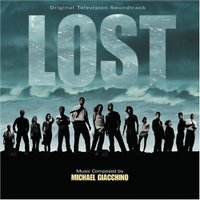 God bless iTunes.
God bless iTunes.
So far I am simply loving this album. Had it going on my iPod as I came off the PATH this morning and started the last leg of the commute to work and the track entitled "Lockedown" came up. Slow, stately, majestic version of Locke's "theme," taken mostly from the season one "Walkabout" episode (it begins in the flashback as the Aussie tour guide tells him he can't go and builds and builds into the reveal that Locke was in a wheelchair but could walk after the accident). I had goosebumps, actual goosebumps, as the music unfolded--this single piece of music is easily one of the most moving pieces of music I've ever heard. Every time I hear it I'm moved. And what gets me about it, about many of the score's primary themes, is how deceptively simple it is, they are. The basic melody is built out of a simple rising scale, with many of the notes repeated once before the melody moves up a tone. But the way Giacchino puts it all together makes it much, much more than it's elegantly simple skeleton.
Which makes me wonder if he does his own orchestrations (probably not--almost no film composers do). If he doesn't, his orchestrator should really get a lot of the credit here. The use of low tones in the harp, strange percussion, random blasts of horn--the instrumental choices do a lot of the heavy lifting here to give the Lost score its unique sound.
Other standout tracks: "Parting Words," used in the series when the raft launched in last year's finale. Again, a very simple structure, but remarkably effective in practice. Triumphant, but with a very subtle way of ominously undercutting that triumph. The music never quite lets you believe that this raft launching will be the savior they want it to be. Also, "Life and Death," used in the series for the Boone's death/Aaron's birth montage. I've written the primary melody here in as my cell phone ringtone, and in doing so was struck, again, by how simple a melody it is. Three notes, almost childlike. And yet so evocative and moving when put together right.
Back to listening.
Until Whenever
No comments:
Post a Comment